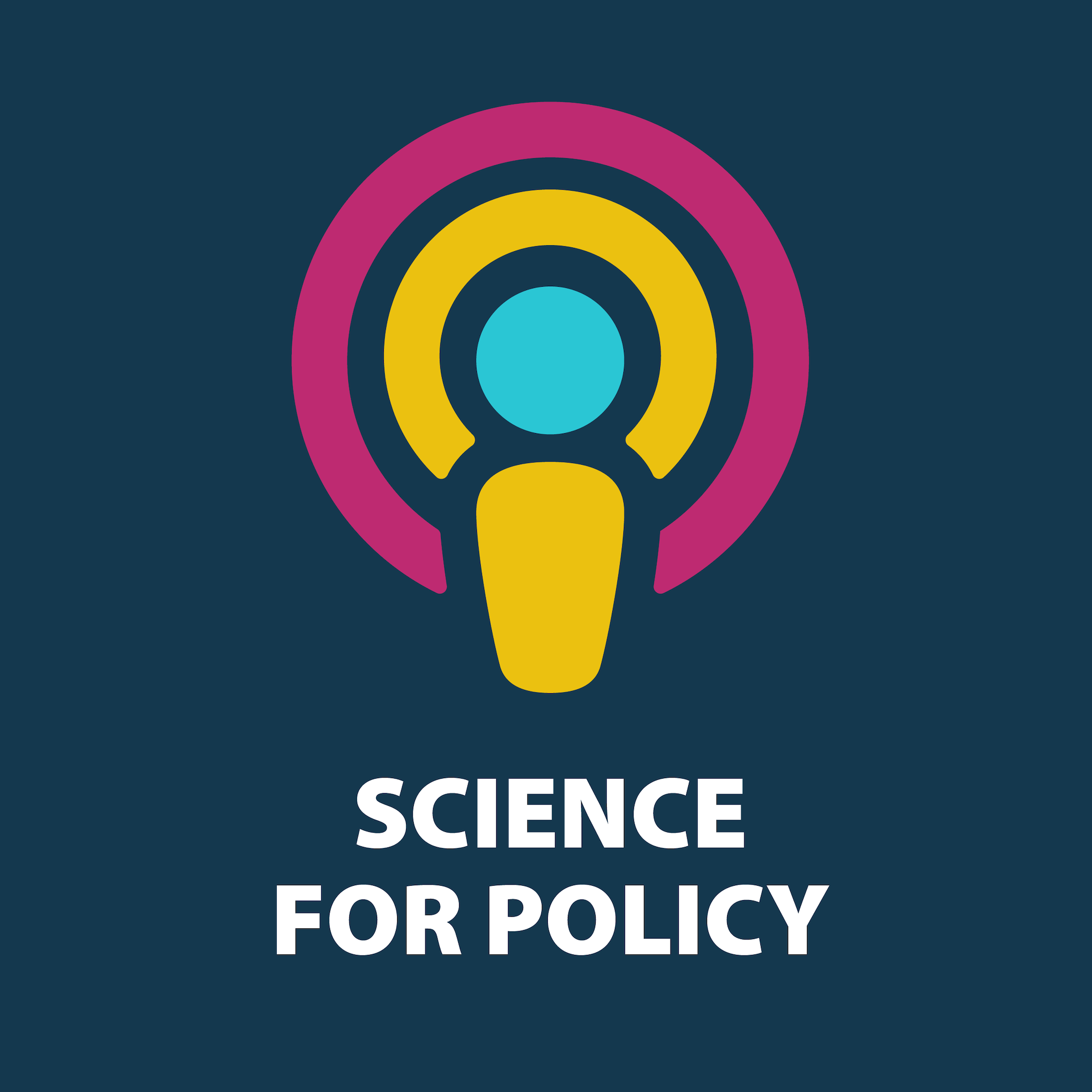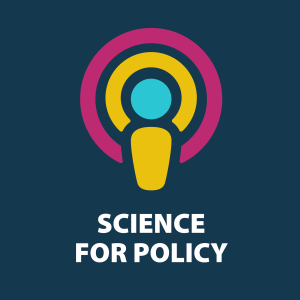
How far should we rely on science to make political decisions? What makes a good science advisor — or a good science advice system? What do we do when the evidence is incomplete or controversial? What happens when science advice goes wrong and how can we fix it? We explore these questions, and many more, in conversation with the researchers, policymakers and communicators who make science advice happen around the world. The Science for Policy podcast is produced the Scientific Advice Mechanism to the European Commission and hosted by Toby Wardman. The many and varied opinions expressed on this podcast are those of the guests themselves. They do not necessarily represent the views of SAPEA or the European Commission.
Episodes

Monday Oct 30, 2023
Tim Marler & Sana Zakaria on gene editing and AI policy
Monday Oct 30, 2023
Monday Oct 30, 2023
Drawing on their broad portfolio of exciting, sci-fi-sounding research areas, Tim Marler and Sana Zakaria from RAND Corporation talk in depth about how the latest scientific evidence on AI and gene-editing can best be communicated to policymakers nationally and globally. What are the hot topics? What decisions do policymakers face right now? Where can different kinds of scientific evidence help to inform those decisions, and where are policymakers on their own?
Resources mentioned in this episode
- RAND Corporation report on machine learning and gene editing: https://www.rand.org/randeurope/research/projects/ai-at-the-helm-of-a-species-evolution.html

Monday Oct 16, 2023
Glenn Fernandez on municipal science advice in the Philippines
Monday Oct 16, 2023
Monday Oct 16, 2023
The Philippines is remarkably exposed to natural disasters, from earthquakes to typhoons to volcanic eruptions.
Dr Glenn Fernandez, a disaster risk management expert, started his science advice career as a masters student and has continued ever since, helping cities and rural municipalities to prepare for and respond to emergencies. In this episode, he shares his experiences and insights with Toby Wardman from the SAM.

Monday Oct 02, 2023
Veera Mitzner on events as science-for-policy activities
Monday Oct 02, 2023
Monday Oct 02, 2023
Veera Mitzner is the organiser of the Sustainability Research and Innovation Congress, a major annual event which brings together thousands of researchers, stakeholders and, yes, policymakers. But how do events like this fit into the broader evidence-for-policy landscape?

Monday Sep 18, 2023
Stella Ladi on science advice in Greece
Monday Sep 18, 2023
Monday Sep 18, 2023

Monday Sep 04, 2023
Ottmar Edenhofer on giving climate advice in Europe
Monday Sep 04, 2023
Monday Sep 04, 2023
The EU climate law created a new institution, the European Scientific Advisory Board on Climate Change, which started work just this year and targets the European Commission, Parliament and Council. Its chair, Professor Ottmar Edenhofer, took time out of his busy schedule to share with us what it's like setting up a new science advice body and how happy he is with their first significant report.
Resources mentioned in this episode

Monday Aug 21, 2023
Hugh Pope on experts in sortition-based democracies
Monday Aug 21, 2023
Monday Aug 21, 2023
Elections are not the only way to power democratic decision-making. A system of government by random selection of citizens, or 'sortition', has been around since at least ancient Athens and, as Hugh Pope explains, has never quite disappeared.
But if we adopt such a radically different way of making policy, what are the implications of science for policy? Do experts take on different roles, and how can citizen-politicians acquire the skills they need to make judgement calls on scientifically complex issues?
Resources mentioned in this episode
- Maurice Pope, 'The Keys to Democracy: Sortition as a new model for citizen power'. http://books.imprint.co.uk/book/?gcoi=71157100410200

Monday Aug 07, 2023
Marc Sanjaume i Calvet on scientific expertise in conflict resolution
Monday Aug 07, 2023
Monday Aug 07, 2023

Monday Jul 17, 2023
Ole Øvretveit & Eystein Jansen on Ukraine, the Arctic and the climate crisis
Monday Jul 17, 2023
Monday Jul 17, 2023
Welcome to the Arctic, where science-for-policy and policy-for-science collide in increasingly complicated ways. You can't make climate-change policy anywhere in the world without scientific evidence we get from the Arctic — but at the same time, being able to get that evidence depends on a delicate balance of policies and geopolitical interests that have made collaborative research between Europe, North America and Russia possible since before the Cold War.
But then you might have heard that Russia has invaded Ukraine, and suddenly the whole institution is under threat. Norwegian experts Ole Øvretveit and Eystein Jansen explain what's going on, and what we might be able to do about it.

Monday Jul 03, 2023
Eleni Zika on curiosity-driven research and its contribution to policy
Monday Jul 03, 2023
Monday Jul 03, 2023

Monday Jun 19, 2023
Barbara Vis on heuristics
Monday Jun 19, 2023
Monday Jun 19, 2023
Politicians are humans, and humans do not always reason syllogistically from premises to conclusions. The problem is amplified when political decisions have to be made fast, under conditions of uncertainty, with either not enough information or far too much.
That's where heuristics come in -- and Professor Barbara Vis is here to help us understand when they are used, what their impacts can be, and how we should take that into account when delivering science advice.

Monday Jun 05, 2023
Heather Rogers & Jelka Zaletel on implementation science
Monday Jun 05, 2023
Monday Jun 05, 2023
Podcast community
Join our listener community, meet other listeners and discuss science-for-policy topics! https://join.slack.com/t/scienceforpol-iju8175/shared_invite/zt-1q94fmb6r-oG3q8QKf8cxXnKMNCkR77A

Monday May 22, 2023
Salvatore Aricò on science advice at the United Nations
Monday May 22, 2023
Monday May 22, 2023
How might the future of science advice look at the global level? Will the establishment of a UN Group of Friends on Science for Action be the catalyst that elevates science advice to the highest levels of multilateral decision-making, and how will this complement the Secretary-General's renewed scientific advisory board? And what should the role of the international science community be?
In this episode, Dr Salvatore Aricò, chief executive of the International Science Council, shares his experience and his vision with Toby Wardman, drawing on practical examples to illustrate how such science advice mechanisms work in practice. We also discuss the challenges and opportunities for scientists and the ISC that can help translate science into action, policy-relevant advice.
Resources mentioned in this episode
-
International Science Council: https://council.science/
-
Join our listener community, meet other listeners and discuss science-for-policy topics! https://join.slack.com/t/scienceforpol-iju8175/shared_invite/zt-1q94fmb6r-oG3q8QKf8cxXnKMNCkR77A

Monday May 08, 2023
Frans Brom on strategic science advice in the Netherlands
Monday May 08, 2023
Monday May 08, 2023
Listener community
Join our listener community, meet other listeners and discuss science-for-policy topics! https://join.slack.com/t/scienceforpol-iju8175/shared_invite/zt-1q94fmb6r-oG3q8QKf8cxXnKMNCkR77A
Resources mentioned in this episode

Monday Apr 24, 2023
Monday Apr 24, 2023
In this episode, Bárbara Willaarts and Thomas Schinko from the International Institute for Applied Systems Analysis explain why transdisciplinarity means more than just collaborating with other areas of science, and why co-creation means more than just working with policymakers to understand their needs... and why both are needed to give really good quality policy advice.

Monday Apr 10, 2023
Please wear a mask
Monday Apr 10, 2023
Monday Apr 10, 2023
In this bonus episode shared from the limited-run podcast The Trust Race, Shane Bergin discusses public and political trust in science, using the advice on mask-wearing during the Covid-19 pandemic as an example.
To listen to other episodes from The Trust Race, visit https://open.spotify.com/show/6jQ59Bxy7vGRecSzinxuaj.
'The Trust Race' has received funding from the EU’s Horizon 2020 research and innovation programme under grant agreement No 870883. The information and opinions are those of the authors and do not necessarily reflect the opinion of the European Commission.

Monday Mar 27, 2023
John O’Connor on education policy evidence in Ireland
Monday Mar 27, 2023
Monday Mar 27, 2023

Monday Mar 13, 2023
The Mystery 100th Guest Episode Wooo
Monday Mar 13, 2023
Monday Mar 13, 2023
Ninety-nine brave adventurers have gone before. Who shall have the privilege of being the one hundredth guest on the Science for Policy podcast?
And will they survive the ordeal?
Join our brand new podcast community -- discuss what you've heard, ask questions to guests and and meet fellow listeners! Sign up here: https://join.slack.com/t/scienceforpol-iju8175/shared_invite/zt-1q94fmb6r-oG3q8QKf8cxXnKMNCkR77A

Monday Feb 27, 2023
Jan-Pieter Krahnen on financial policy advice
Monday Feb 27, 2023
Monday Feb 27, 2023
Is financial advice science advice? How independent can a financial advisor be? Did the world of economic policy advisors have their epiphany in 2008 in the same way that other sciences did in 2020? If anyone can answer these questions, it's Professor Jan-Pieter Krahnen!

Monday Feb 13, 2023
Eleanor MacKillop & James Downe on knowledge brokering organisations
Monday Feb 13, 2023
Monday Feb 13, 2023

Monday Jan 30, 2023
Carina Keskitalo on undead models of science advice
Monday Jan 30, 2023
Monday Jan 30, 2023
Resources mentioned in this episode
- The social aspects of environmental and climate change. http://urn.kb.se/resolve?urn=urn:nbn:se:umu:diva-191872
Help us choose a channel for our listeners' community: https://bit.ly/3XE8LRY

Monday Jan 16, 2023
Christiane Gerblinger on how experts self-sabotage
Monday Jan 16, 2023
Monday Jan 16, 2023
When science advisors are employed by governments, how do they reconcile the competing needs to accurately convey the science, while ensuring it can be of maximum use in the current political context?
Dr Christiane Gerblinger has one answer: her research suggests that advisors adopt strategies to make themselves deliberately ignorable.
Resources mentioned in this episode
- How Government Experts Self-Sabotage: The language of the rebuffed. https://press.anu.edu.au/publications/how-government-experts-self-sabotage

Monday Dec 19, 2022
Noam Obermeister on how science advisors learn
Monday Dec 19, 2022
Monday Dec 19, 2022
So you want to be a science advisor? The bad news: there aren't really any books, powerpoint presentations or training courses that can teach you the skills you need. The good news: doctoral researcher Noam Obermeister has found out everything he can about the learning journeys of scientists who work with policymakers, both what they learn and how. And he might even be able to tell you if you will sink or swim.
Resources mentioned in this episode
- Twitter thread on science advisors' learning journeys: https://twitter.com/NObermeister/status/1584932780840194048

Monday Dec 05, 2022
Geoff Mulgan on how to synthesise knowledge
Monday Dec 05, 2022
Monday Dec 05, 2022
On this podcast, and in the world of science advice studies generally, we spend a lot of time discussing the science-policy interface and what should exist on the 'science' side of it in order to most effectively support policymaking. But Professor Sir Geoff Mulgan asks a different question: what happens on the other side of the interface, when policymakers are landed with a vast array of knowledge, theory and opinion, and have to somehow construct from that — and their own political and economic realities — an intelligible way forward.

Monday Nov 21, 2022
Barbara Prainsack on ethics advice in a crisis
Monday Nov 21, 2022
Monday Nov 21, 2022
We live in an age of crisis — and the crises that we face are more numerous, more widespread and more overlapping than ever before. In the chaos of high-pressure, life-and-death policymaking, politicians could benefit not just from scientific advice but also from the input of ethicists. That's where Barbara Prainsack, chair of the European Group on Ethics and New Technologies, comes into the picture.
Resources mentioned in this episode
-
Statement on values in times of crisis: https://research-and-innovation.ec.europa.eu/document/1690e112-9826-4ede-811b-fad63167b9d9_en (available from 22 November)
-
Evidence review report and Scientific opinion on strategic crisis management in the EU: https://www.sapea.info/crisis/ (available from 22 November)

Monday Nov 07, 2022
Rebecca Natow on politically-infused evidence use
Monday Nov 07, 2022
Monday Nov 07, 2022
Resources mentioned in this episode
-
Reexamining the federal role in higher education https://www.tcpress.com/reexamining-the-federal-role-in-higher-education-9780807766767
-
Higher education rulemaking: the politics of creating regulatory policy https://www.press.jhu.edu/books/title/11563/higher-education-rulemaking
